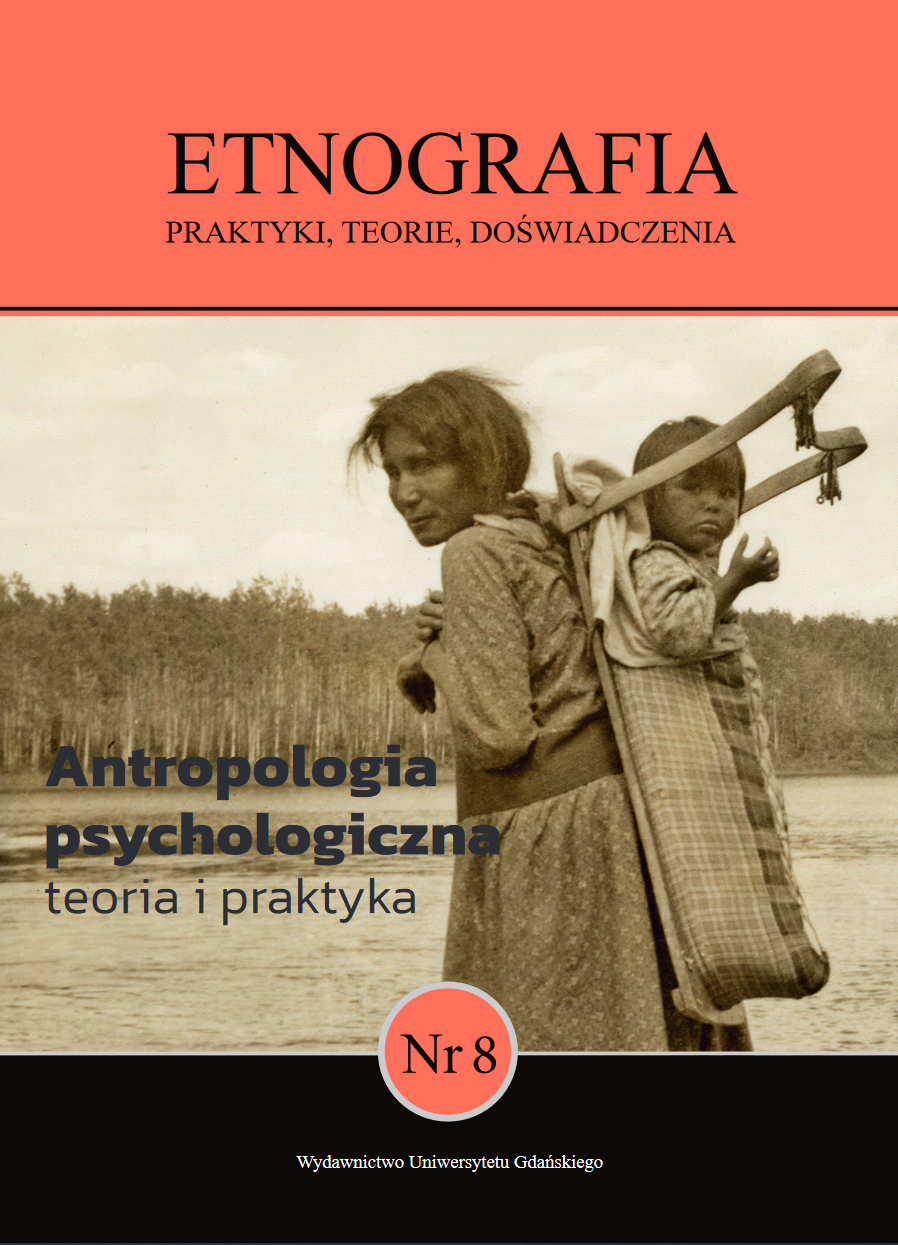Doświadczenie traumatyczne w Rwandzie
DOI:
https://doi.org/10.26881/etno.2022.8.07Słowa kluczowe:
trauma, Rwanda, genocide, Holocaust, decolonial studiesAbstrakt
In the article, I redefine the traumatic experience that has been ubiquitous on both individ- ual and collective levels for people in Rwanda since the 1994 genocide. Using ethnographic and psychotraumatological methods, I point out the limitations of the Western-centric psychoanalytic approach and the presence of discursive elements derived directly from the public discourse on the Holocaust, which – too often understood as a model discourse – in practice makes it impossible to recognize the nature of a specific trauma or real identities of the injured subjects. In the text, I propose to adopt an emic/vernacular position on this issue, and to ponder the decolonization potential inherent in such a perspective.
Downloads
Bibliografia
Ankersmit, F. (2004). Pamiętając Holocaust: żałoba i melancholia. Przeł. A. Ajschtet, A. Kubis, J. Regulska. W: E. Domańska (red.) Narracja, reprezentacja, doświadczenie. Studia z teorii historiografii (s. 403–429). Kraków: Universitas.
Blackie, L., Hitchcott, N. (2018). ‘I am Rwandan’: Unity and reconciliation in post-genocide Rwanda. Genocide Studies and Prevention: An International Journal, 12(1), 24–37.
Caruth, C. (2010). Teoria traumy jako siła lektury. Przeł. K. Bojarska. Teksty Drugie, 6, 125–126.
Cessou, S. (2014). Naasson Munyandamutsa, un psychiatre rwandais. RFI. http://www.rfi.fr/ mfi/20140214-rwanda-genocide-suisse-naasson-munyandamutsa-psychiatrie [dostęp: 3.06.2020].
Craps, S. (2012). Postcolonial witnessing: Trauma out of bonds. Basingstoke: Palgrave Macmillan. Domańska E. (2012). Historia egzystencjalna. Warszawa: Wydawnictwo Naukowe PWN.
Frankl, V.E. (2015). Człowiek w poszukiwaniu sensu. Przeł. A. Wolnicka. Warszawa: Czarna Owca.
Gałązka, M., Soszyński D., Dmitruk, K. (2018). Neurobiologiczne podstawy zespołu stresu pourazowego – możliwe znaczenie zmiany rytmów okołodobowych. Postępy Higieny i Medycyny Doświadczalnej, 72, 406–416.
Hastrup, K. (2008). Droga do antropologii. Między doświadczeniem a teorią. Przeł. E. Klekot. Kraków: Wydawnictwo Uniwersytetu Jagiellońskiego.
Herdt, G.H. (1981). Guardians of the flutes: Idioms of masculinity. New York: McGraw-Hill. Ibreck, R. (2010). The Politics of mourning: Survivor contributions to memorials in post-genocide Rwanda. Memory Studies, 3(4), 330–343.
Jokic, A. (2013). Conventional wisdom on Yugoslavia and Rwanda: Methodological perils and moral implications. Journal of Philosophy of International Law, 4(1), 1–29.
Joseph, S., Linley, A. (eds.). (2007). Trauma, recovery, and growth: Positive psychological perspectives on posttraumatic stress. Hoboken: Wiley.
LaCapra, D. (2001). Writing history, writing trauma. Baltimore: Johns Hopkins University Press.
Leys, R. (2007). From guilt to shame: Auschwitz and after. Princeton: Princeton University Press.
Łysak, T. (2015). Trauma – od genealogii pojęcia do studiów nad traumą. W: T. Łysak (red.) Antologia studiów nad traumą (s. 5–30). Kraków: Universitas.
Mamdani, M. (2001). When victims become killers: Colonialism, nativism, and the genocide in Rwanda. Princeton: Princeton University Press.
Mwambari, D. (2021). Agaciro, vernacular memory, and the politics of memory in post- -genocide Rwanda. African Affairs, 120(481), 611–628.
Niederland, W. (1982). Psychiatric status of Holocaust survivors. American Journal of Psy- chiatry, 139(12), 1646.
Orwid, M. (2009). Trauma. Kraków: Wydawnictwo Literackie.
Parin, P. (2018 [1989]). The mark of oppression: Jews and homosexuals as strangers. Przeł. C.S. Michel. W: L.B. Boyer, S.A. Grolnick (eds.), The psychoanalytic study of society, Vol. 14: Essays in honor of Paul Parin (s. 15–39). London: Routledge.
Parin, P., Morgenthaler, F., Parin-Mathey, G. (1980). Fear thy neighbor as thyself: Psychoanaly- sis and society among the Anyi of West Africa. Przeł. P. Klamerth. Chicago: University of Chicago Press.
Prunier, G. (1998). The Rwanda crisis: History of a genocide. London: Hurst.
Robben, A.C.G.M., Suárez-Orozco, M.M. (eds). (2000). Cultures under siege: Collective violence and trauma. Cambridge: Cambridge University Press.
Rothberg, M. (2009). Multidirectional memory: Remembering the Holocaust in the age of decolonization. Stanford: Stanford University Press.
Rutkowski, K., Dembińska, E. (2016). Powojenne badania stresu pourazowego w Krakowie. Część I. Badania do 1989 roku. Psychiatria Polska, 50(5), 935–944.
Stone, D. (2004). Genocide as transgression. European Journal of Social Theory, 7(1), 45–65. Suárez-Orozco, M.M. (1994). Remaking psychological anthropology. W: M.M. Suárez-Orozco, D. Spindler, L. Spindler (eds.), The making of psychological anthropology II (s. 10–59). Fort Worth: Harcourt Brace.
Summerfield, D. (1999). A critique of seven assumptions behind psychological trauma programmes in war-affected areas. Social Science and Medicine, 48(10), 1449–1462. Summerfield, D. (2001). The invention of post-traumatic stress disorder and the social usefulness of a psychiatric category. British Medical Journal, 322(7278), 95–98.
Weiss, T., Berger, R. (eds.). (2010) Posttraumatic growth and culturally competent practice: Lessons learned from around the globe. Hoboken: Wiley.
Williamson Sinalo, C. (2018). Rwanda after genocide: Gender, identity and posttraumatic growth. Cambridge: Cambridge University Press
Wolska, D. (2012). Odzyskać doświadczenie. Sporny temat humanistyki współczesnej. Kraków: Universitas.
Wosińska, M. (2017a). Murambi is not Auschwitz: The Holocaust in representations of the Rwandan genocide. W: M. Gabowitsch (ed.), Replicating atonement: Foreign models in the commemoration of atrocities (s. 187–208). Basingstoke: Palgrave Macmillan.
Wosińska, M. (2017b). Świadek z Rwandy. Świadek poza kategoriami. W: A. Bartuś (red.), Świad- kowie. Między ofiarą a sprawcą zbrodni (s. 257–277). Oświęcim: Państwowe Muzeum Auschwitz-Birkenau.
Opublikowane
Jak cytować
Numer
Dział
Licencja
Czasopismo wydawane jest na licencji Creative Commons Uznanie autorstwa-Na tych samych warunkach 4.0 Międzynarodowe.

 Uniwersyteckie Czasopisma Naukowe
Uniwersyteckie Czasopisma Naukowe








